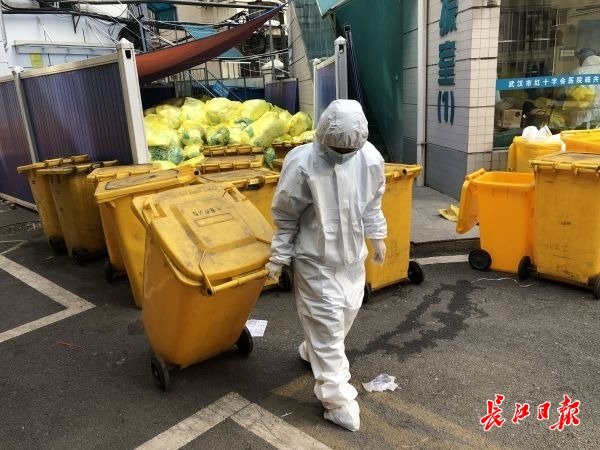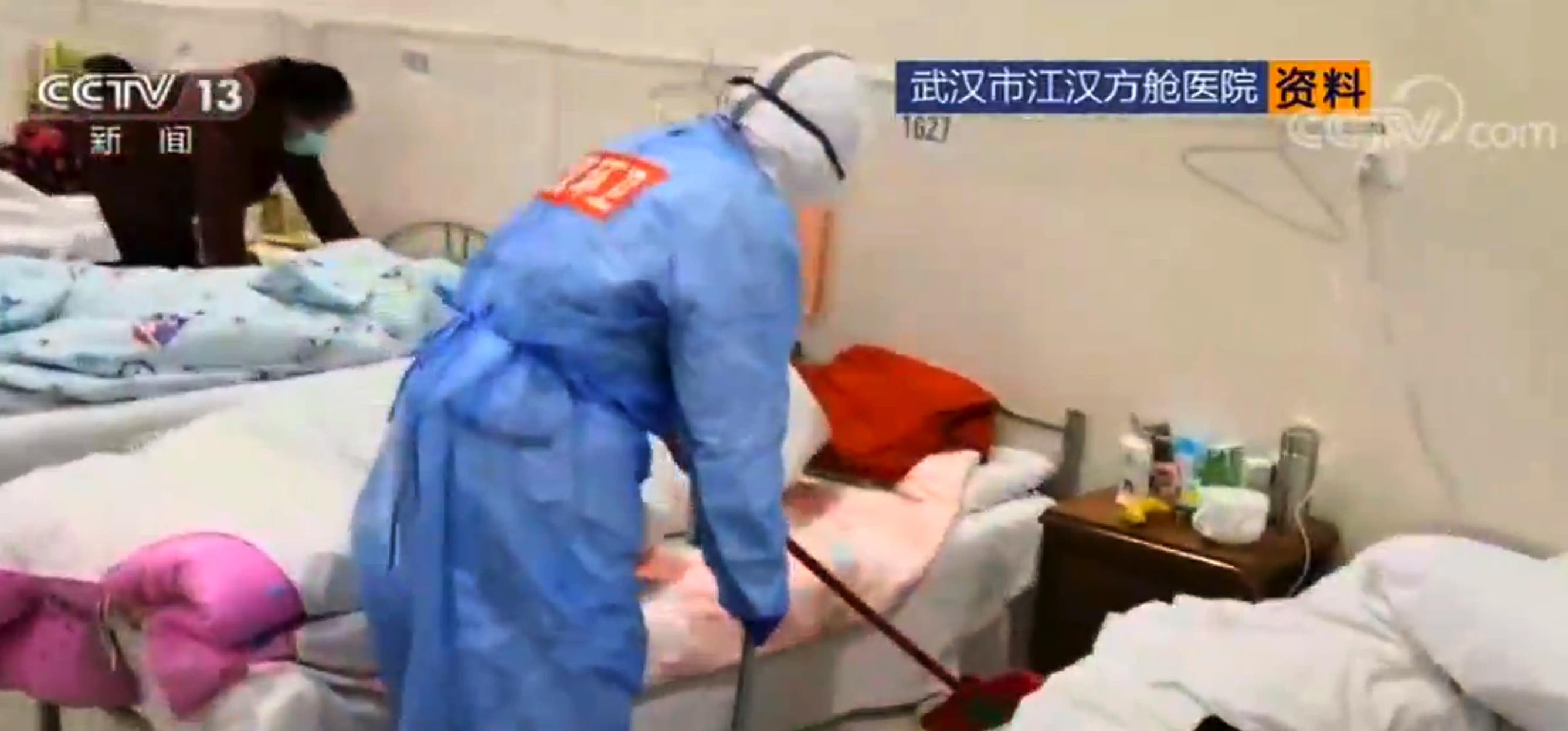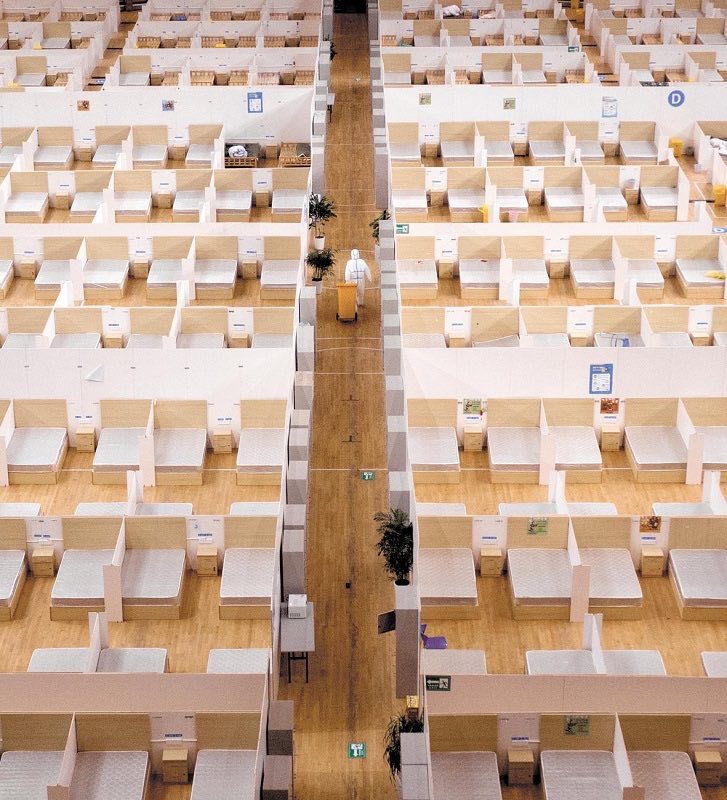


"It is not beauty that endears, it's love that makes us see beauty."
--- Leo Tolstoy, War and Peace
Throughout the entire coronavirus outbreak period, and even before it, there has always been one unsung group of workers who have silently safeguarded the city of Wuhan through their daily efforts. Before the outbreak, they cleaned the city’s streets. During the outbreak, they disinfected wards and disposed of medical waste in hospital isolation wards, making their contribution to the battle against the coronavirus that engulfed China.

Man Caimei, a sanitary workerin Wuhan, works at Wuhan Red Cross Hospital. (Photo/cjn.cn)
35-year-old Man Caimei is one such ordinary sanitary worker in Wuhan. On Jan 25, the first day of the Chinese New Year, Man learned that designated hospitals treating COVID-19 patients were in need of more sanitary workers, as there had been a huge increase in the amount of medical waste generated after the epidemic broke out. She immediately signed up for the mission, despite concerns from her family.
“People from all over the country are risking their lives to help Wuhan. As a Wuhan local, I had to do something,” Man said.
Man was among the first batch of cleaners to enter the isolation wards at Wuhan Red Cross Hospital. She was put in charge of disinfecting and cleaning the ICU hot zones on the 6th floor.

Man Caimei works at Wuhan Red Cross Hospital. (Photo/cjn.cn)
Before Man and her colleagues started working, the hospital trained them how to properly put on protective gear and disinfect themselves. As non-health care workers, they were not allowed to talk to or contact patients, in order to reduce the risk of infection.
“We had to wear three layers of gloves. Non-medical waste went into black garbage bags, while medical waste went into yellow garbage bags, which you couldn’t touch,” Man said.
"Cleaning the hospital is much harder than cleaning the streets, because the protective suits, gloves, masks and other protective gear really hindered my movements,” Man said.
During an eight-hour shift, Man had to clean and disinfect isolation wards as well as process medical waste materials every day. As some patients were difficult to move, she also helped dispose of garbage from bedside tables or emptied chamber pots for patients.
Man was not afraid of working in hot zones, despite being so close to the virus. “I’m fully equipped with protective gear, so I’m not frightened.”

Man Caimei (L) works at Jianghan makeshift hospital. (Screenshot of CCTV News)
After completing her mission at the Red Cross Hospital, Man was supposed to go back home and be replaced by her colleague, but she decided to stay and continue her volunteer work. This time, she went to Jianghan makeshift hospital.
Unlike the hot zones in designated hospitals, makeshift hospitals mainly treated patients with mild symptoms. However, that didn’t make Man’s work any easier, as there were many more patients in makeshift hospitals than in designated hospitals, and the density of patients was also greater.
“The first time I entered the makeshift hospital, I was a little scared to see the thousands of hospital beds,” she said.

Man Caimei cleans wards at Jianghan makeshift hospital. (Screenshot of CCTV News)
Man, together with more than 160 cleaners, was mainly responsible for cleaning wards and public toilets as well as transferring garbage. At the peak of the outbreak, the hospital produced six tons of garbage per day, along with more than 3,000 lunch boxes. One empty trash bin could be piled up with two meters of garbage in just one hour.
In order to save time and protective suits, Man had to work continuously for at least 6 hours, just like the medical staff, with no drink or bathroom breaks. “The mask often stuck to my face with sweat, which made it hard for me to breathe,” she said, recalling how deep marks were often left on her face from the constant mask use.

A sanitary worker at a makeshif hospital in Wuhan cleans wards after the hospital closes on March 8. (Photo/hubeidaily.net)
After the outbreak of COVID-19 started, 36,000 sanitary workers in Wuhan devoted themselves to working on the frontline of environmental health protection. Among this number, more than 2,400 cleaners went to designated hospitals, over 30 makeshift hospitals and more than 400 quarantine sites to carry out cleaning work and dispose of medical refuse.
Man and her colleagues’ tireless efforts and bravery have impressed countless Chinese people, including frontline medical workers. “These cleaners are ordinary but extraordinary. They gave us a sense of security, so that we could work safely in the hospital,” said a nurse named Yang Yang.

Man Caimei resumes her usual work on the streets in April. (Screenshot of CCTV News)
On March 9, Jianghan makeshift hospital finally closed after treating 1,848 novel coronavirus-infected patients. After spending weeks in quarantine, Man returned home and resumed her usual work on the streets.
After she came back, she was able to eat hot-dry noodles again, a dish she had missed tasting for nearly two months. She was also delighted to see that Wuhan was finally recovering from its 76-day lockdown.
“The leaves were still falling when I left, and now the trees are all green again. Our life is gradually returning to normal. It feels good,” she said.

 Award-winning photos show poverty reduction achievements in NE China's Jilin province
Award-winning photos show poverty reduction achievements in NE China's Jilin province People dance to greet advent of New Year in Ameiqituo Town, Guizhou
People dance to greet advent of New Year in Ameiqituo Town, Guizhou Fire brigade in Shanghai holds group wedding
Fire brigade in Shanghai holds group wedding Tourists enjoy ice sculptures in Datan Town, north China
Tourists enjoy ice sculptures in Datan Town, north China Sunset scenery of Dayan Pagoda in Xi'an
Sunset scenery of Dayan Pagoda in Xi'an Tourists have fun at scenic spot in Nanlong Town, NW China
Tourists have fun at scenic spot in Nanlong Town, NW China Harbin attracts tourists by making best use of ice in winter
Harbin attracts tourists by making best use of ice in winter In pics: FIS Alpine Ski Women's World Cup Slalom
In pics: FIS Alpine Ski Women's World Cup Slalom Black-necked cranes rest at reservoir in Lhunzhub County, Lhasa
Black-necked cranes rest at reservoir in Lhunzhub County, Lhasa China's FAST telescope will be available to foreign scientists in April
China's FAST telescope will be available to foreign scientists in April